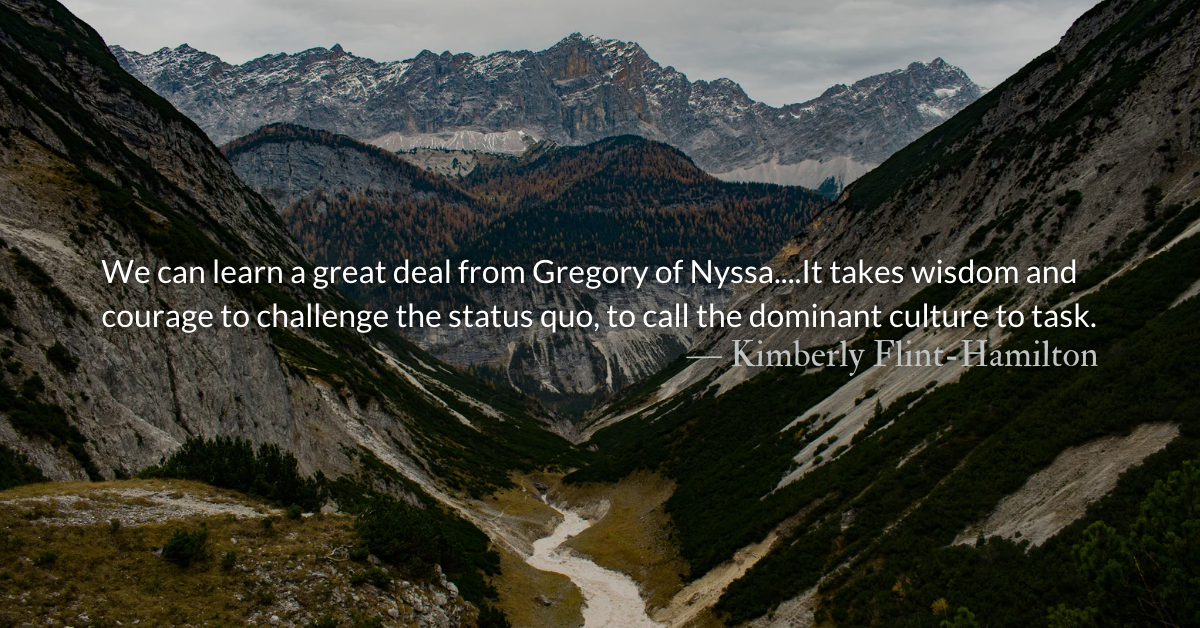Scripture: Romans 12.9-10
Love must be sincere. Hate what is evil; cling to what is good. Be devoted to one another in love. Honor one another above yourselves.
Reflection: Slavery, Racism, and a Lone Christian Voice
By John Tillman
Yesterday we quoted parts of Kimberly Flint-Hamilton’s article, Gregory of Nyssa and the Culture of Oppression about the unique Christian theology that defeats the ideology of white supremacy and racism. Today, I wanted to give some space for a more detailed explanation of Gregory’s theological stance as outlined by Hamilton.
In the late fourth century a lone Christian voice spoke out against the oppressive institution of slavery in a way that none had before. Gregory of Nyssa (c. 335-394), one of the Cappadocian Fathers, laid out a line of reasoning vilifying the institution as incompatible with Christianity in his fourth homily on Ecclesiastes. It is considered the “first truly ‘anti-slavery’ text of the patristic age.”
Gregory understands Genesis 1:26-27 to be about not just the creation of the first humans, but “the fullness of humankind, comprehended by God’s ‘foresight,’” This fullness of humankind, which Gregory calls pleroma, includes all humans, from the very first to the last, throughout all ages.
God endowed human beings with dominion over all other creatures, but not over other humans, so slavery calls God’s will into question. “Irrational beasts are the only slaves of humankind,” Gregory writes. “but by dividing the human species into two with ‘slavery’ and ‘ownership,’ you have caused it to be enslaved to itself, and to be owner of itself.”19
Since all humans are reflected in pleroma, the beauty of pleroma cannot be revealed by subordinating one portion of humanity to another. Only in universal freedom can the fullness of pleroma unfold, with each individual human being contributing. Slavery, racism, and oppression in general, are completely incompatible with the will of God.
We can learn a great deal from Gregory of Nyssa. All corners of humanity, including men, women, blacks, whites, Hispanics, Asians, Native Americans, and people of every race, ethnicity, class, and nationality are part of pleroma and reflect God’s beauty and perfection.
As difficult as it can be to see past the veil of institutionalized oppression, we have a moral obligation to try.
It takes wisdom and courage to challenge the status quo, to call the dominant culture to task. And it takes hard work to defuse the standard arguments that we have all heard since childhood— “They wouldn’t be poor if they worked hard,” “There wouldn’t be so many of them in prisons if they weren’t guilty,” “It isn’t really their fault that they suffer so much from unemployment and poverty, they just lack the appropriate work ethic.” Fifteen hundred years later, we are still fighting the anti-slavery, and anti-racism, and anti-oppression battles. We may be victorious yet, but it will take all of us to engage the battle.
*Quotes condensed from Kimberly Flint-Hamilton’s article, Gregory of Nyssa and the Culture of Oppression
The Cry of the Church
O God, come to my assistance! O Lord, make haste to help me!
– From The Divine Hours: Prayers for Summertime by Phyllis Tickle.
Full prayer available online and in print.
Today’s Readings
1 Samuel 14 (Listen – 9:01)
Romans 12 (Listen – 2:58)






